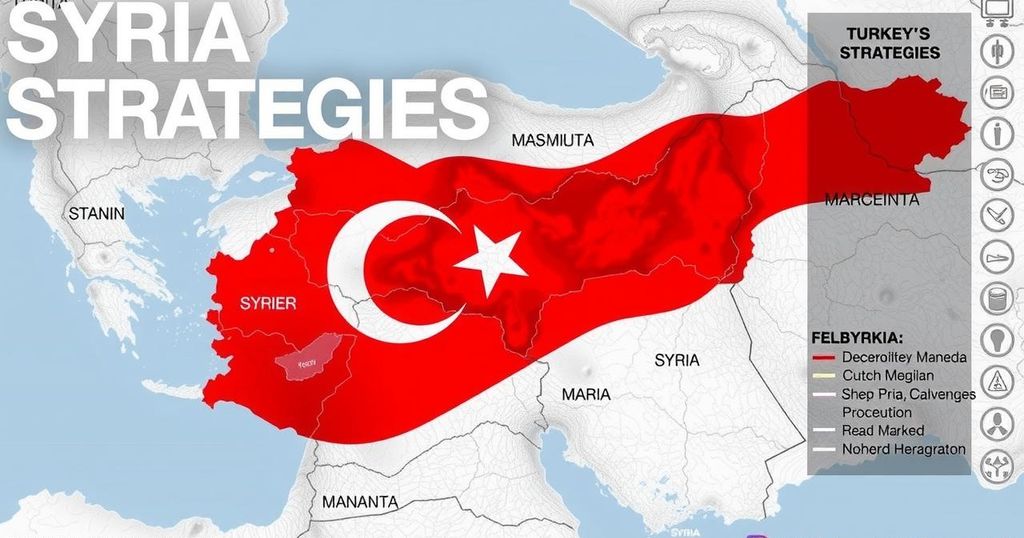Turkey’s Strategic Advancements Amidst Syria’s Evolving Landscape

Turkey’s recent military operations in Syria signify a calculated shift in the balance of power following the unexpected and rapid collapse of Bashar al-Assad’s regime. While aiming to establish a transitional government and facilitate reconciliation among Syrian factions, Turkey faces critical challenges from the SDF and is actively positioning itself to manage refugee returns and reconstruction efforts.
The recent rapid collapse of Bashar al-Assad’s government in Syria has shifted dynamics, significantly impacting Turkey’s role in the region. Ankara had anticipated Assad’s fall but was surprised by the speed at which it occurred. Initially, Turkey allowed limited actions by aligned Syrian opposition groups to exert pressure on Assad amid ongoing assaults on civilian areas. However, this operation quickly escalated, leading to Turkey’s dominance in the region as it coordinated efforts for dialogue between the Syrian government and opposition forces.
Turkish influence has been evident throughout the operation, with officials skillfully navigating relations with Russia and managing the Syrian armed opposition. President Recep Tayyip Erdogan indicated forthcoming “good news” for Turkey’s southern border security, as there are expectations that Turkish-supported governance frameworks will assist with a transitional government post-Assad. Turkey aims not only to facilitate reconciliation among various opposition factions but also to establish a governance model that represents the political diversity of Syria.
The Syrian Democratic Forces (SDF), largely controlling vital resources in eastern Syria, represent a pivotal concern for Turkey, which perceives them as a terrorist group due to their affiliation with the PKK. Turkish officials have reiterated that they will not tolerate their control in key areas and are prepared to potentially engage in military actions to address this issue. Furthermore, Turkey’s focus also extends to managing the humanitarian aspect, particularly the return of over three million Syrian refugees currently residing in Turkey.
As the potential for reconstruction in Syria becomes evident, Turkey is likely to spearhead these efforts, coordinating with other regional allies and organizations. The anticipated gradual return of refugees will hinge on significant enhancements in security, infrastructural restoration, and economic stability in the post-conflict environment.
In the context of the ongoing Syrian Civil War, Turkey has significantly adjusted its strategy following the seemingly imminent downfall of the Assad regime. Turkish officials have long considered Assad’s government as unsustainable, but the speed of its collapse post-diplomatic engagements and military pressures took many by surprise. The rise of Syrian opposition groups, particularly Hay’at Tahrir al-Sham (HTS), has allowed Turkey to position itself favorably, as it seeks to stabilize its southern borders while managing a complex network of Syrian governance and refugee affairs. Turkey’s sustained influence over HTS has extended to shaping local governance models conducive to Turkey’s national interests, particularly as they pertain to regional security and refugee repatriation.
In summary, Turkey’s evolving role in Syria reflects its strategic interests in regional supremacy and stability. As Assad’s regime falters, Ankara emerges as a central player in both orchestrating military activities and fostering a governance framework that allows for a diverse representation of Syrian political factions. With pressing issues such as the management of the SDF and the return of millions of Syrian refugees, Turkey is poised to lead reconstruction initiatives while maintaining its strategic objectives in the area. This confluence of military, political, and humanitarian engagements underscores Turkey’s intricate involvement in shaping Syria’s future.
Original Source: www.middleeasteye.net








